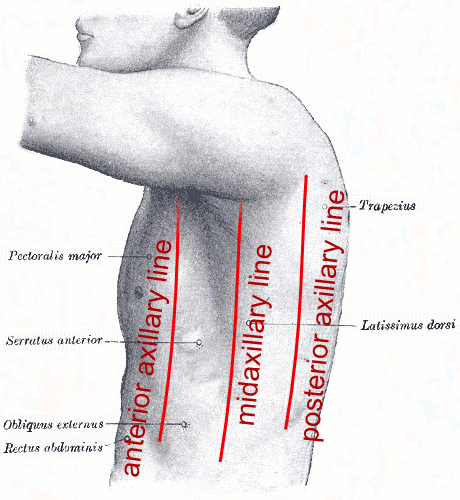Axillary lines
(Redirected from Linea axillaris posterior)
The axillary lines refer to imaginary vertical lines on the human body that run through the axilla (the armpit). They play a crucial role in clinical examinations and descriptions, particularly in thoracic procedures, as they serve as reference points. These lines are categorically divided into three distinct lines: the anterior axillary line, midaxillary line, and the posterior axillary line.
Description[edit | edit source]
Each of the axillary lines offers specific information and is located in a particular area of the axilla:
Anterior Axillary Line[edit | edit source]
This line runs vertically down from the anterior axillary fold, which is where the pectoralis major muscle of the chest connects with the upper arm. Clinically, this line is of significance in thoracentesis, a procedure where fluid is removed from the pleural space.
Midaxillary Line[edit | edit source]
The midaxillary line is positioned halfway between the anterior and posterior axillary lines, extending from the apex of the axilla and running down the middle of the lateral aspect of the chest and abdomen. This line serves as an important landmark in many surgical and diagnostic procedures, including the insertion of chest tubes.
Posterior Axillary Line[edit | edit source]
Originating from the posterior axillary fold, where the latissimus dorsi muscle of the back joins with the upper arm, the posterior axillary line runs vertically downward. This line is frequently used as a landmark in procedures targeting the posterior thoracic and abdominal regions.
Clinical Relevance[edit | edit source]
The axillary lines are pivotal for many clinical procedures. For example:
- During thoracentesis, the anterior axillary line often serves as the lateral boundary.
- The midaxillary line can be used as a guide for the safe placement of chest drains, ensuring they are inserted in the correct position to prevent injury to internal structures.
- In cardiology, the apex beat can be located in relation to the midaxillary line.
Moreover, these lines help in accurately describing the location of wounds, rashes, or other skin lesions in the lateral thoracic and abdominal areas.
See Also[edit | edit source]
See also[edit | edit source]
| Anatomical planes and lines | ||||||
|---|---|---|---|---|---|---|
|
Search WikiMD
Ad.Tired of being Overweight? Try W8MD's physician weight loss program.
Semaglutide (Ozempic / Wegovy and Tirzepatide (Mounjaro / Zepbound) available.
Advertise on WikiMD
|
WikiMD's Wellness Encyclopedia |
| Let Food Be Thy Medicine Medicine Thy Food - Hippocrates |
Translate this page: - East Asian
中文,
日本,
한국어,
South Asian
हिन्दी,
தமிழ்,
తెలుగు,
Urdu,
ಕನ್ನಡ,
Southeast Asian
Indonesian,
Vietnamese,
Thai,
မြန်မာဘာသာ,
বাংলা
European
español,
Deutsch,
français,
Greek,
português do Brasil,
polski,
română,
русский,
Nederlands,
norsk,
svenska,
suomi,
Italian
Middle Eastern & African
عربى,
Turkish,
Persian,
Hebrew,
Afrikaans,
isiZulu,
Kiswahili,
Other
Bulgarian,
Hungarian,
Czech,
Swedish,
മലയാളം,
मराठी,
ਪੰਜਾਬੀ,
ગુજરાતી,
Portuguese,
Ukrainian
Medical Disclaimer: WikiMD is not a substitute for professional medical advice. The information on WikiMD is provided as an information resource only, may be incorrect, outdated or misleading, and is not to be used or relied on for any diagnostic or treatment purposes. Please consult your health care provider before making any healthcare decisions or for guidance about a specific medical condition. WikiMD expressly disclaims responsibility, and shall have no liability, for any damages, loss, injury, or liability whatsoever suffered as a result of your reliance on the information contained in this site. By visiting this site you agree to the foregoing terms and conditions, which may from time to time be changed or supplemented by WikiMD. If you do not agree to the foregoing terms and conditions, you should not enter or use this site. See full disclaimer.
Credits:Most images are courtesy of Wikimedia commons, and templates, categories Wikipedia, licensed under CC BY SA or similar.
Contributors: Prab R. Tumpati, MD

